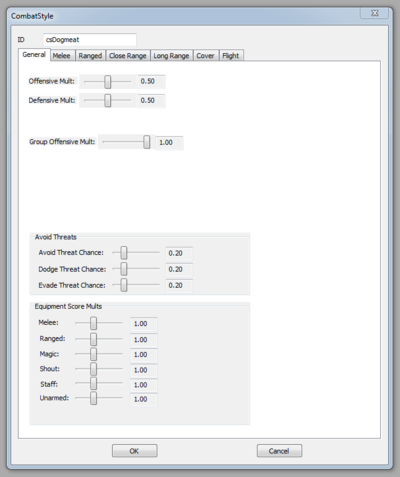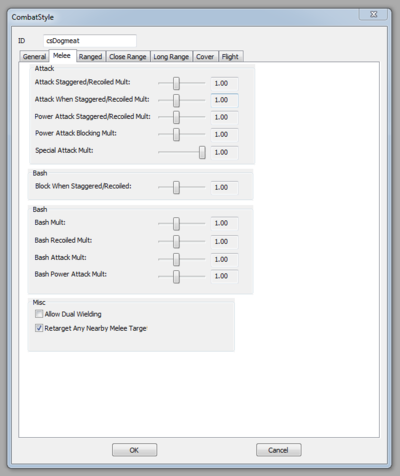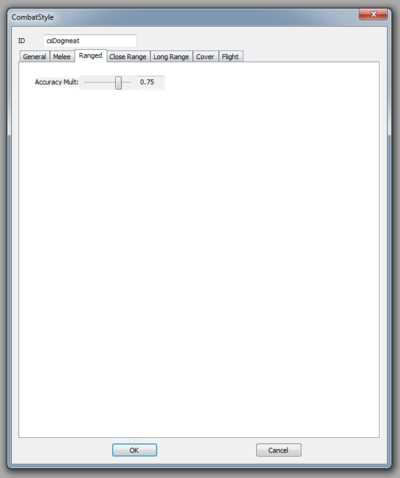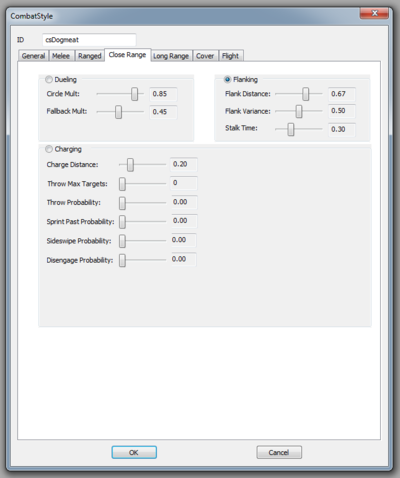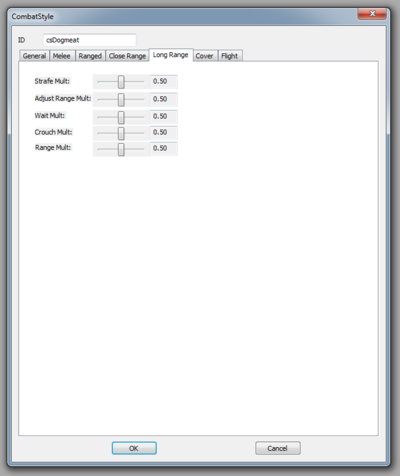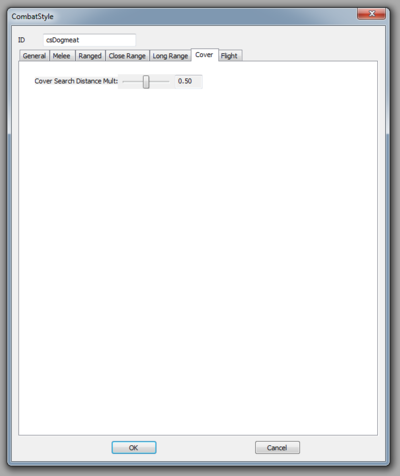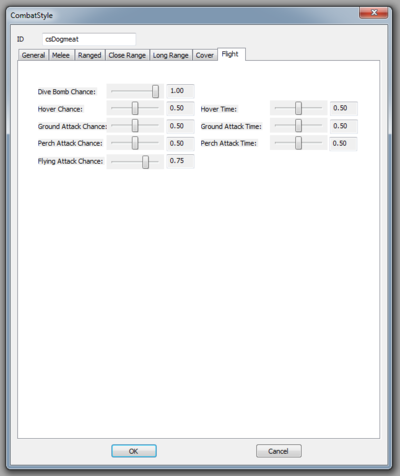CombatStyle
Revision as of 23:07, 28 March 2018 by imported>Qazaaq (format and details)
Type: CSTY
Papyrus: CombatStyle Script
A combat style represents an Actor's overall approach to combat. The CombatStyle object is found within the Object Window under the Miscellaneous Category.
Editor Dialog
- ID: The ID, also referred to as Editor ID, is used by the Creation Kit to uniquely identify this record within a Data File.
General Tab
- Offensive Mult: See Defensive Mult. The higher the number, the more likely a character will attack, the more often they will attack, and the more often they will power attack.
- Defensive Mult: See Offensive Mult. The higher the number, a character will block more often, hold their block up longer, and bash more often if they're capable of doing so.
- Group Offensive Mult: This will override the offensive mult above. The more actors that are attacking the player, the less offensive they will be, based on this mult. The higher the mult, the more offensive they'll be in groups.
- Avoid Threat Chance: This property is depreciated, obsolete, or does not appear to be used by the game.
- Equipment Score Mults: The higher the number, the more likely the Actor will be to use that Weapon. This number is multiplied into the damage output of the attack. So if you have a melee attack that has a small amount of damage, and a spells that do a lot, you have to 'jack' this mult up very high on the melee attack for the actor to prefer melee attacks over magic.
Melee Tab
- Attack:
- Attack Staggered Mult: The higher the number, the more likely an NPC will attack a player in a stagger state
- Power Attack Staggered: The higher the number, the more likely an NPC will power attack a player in a stagger state
- Power Attack Blocking: The higher the number, the more likely an NPC will power attack a player in a blocking state (and thus, break a block)
- Special Attack: This property is depreciated, obsolete, or does not appear to be used by the game.
- Bash:
- Bash Mult: The higher the number, the more likely an NPC will bash the player (either with a shield or a special attack flagged as a 'bash.' This can result in the player being staggered, thus interrupting animations and temporarily disorienting & disabling actions.)
- Bash Recoiled: The higher the number, the more likely an NPC will bash a player who is in a recoiled state. A recoiled state is when the player (or npc) gets his regular attack blocked, thus recoiling him.
- Bash Attack Mult: The higher the number, the more likely an NPC will bash a player who's actively attacking, or in an attack state.
- Bash Power Attack Mult: The higher the number, the more likely an NPC will bash a player who's actively power attacking, or in an power attack state.
- Misc:
- Allow Dual Wielding: Allows an NPC to dual wield. Note, this will only work on NPCs who have Dual Wielding animations - currently that's only 'humanoid' NPCs.
Ranged Tab
Close Range Tab
Only one of these can be active:
- Dueling:
- Circle Mult: How much the actor circles the target instead of staying still.
- Fallback Mult: Chance to back off from the target.
- Flanking:
- Flank Distance: Distance to target when trying to flank.
- Stalk Time: Time spent flanking before attacking.
Long Range Tab
- Strafe Mult: How much the actor strafes to dodge projectiles when not in melee range. Causes actors to dodge projectiles even if they haven't noticed the player?
Cover Tab
Flight Tab
- Dive Bomb Chance: Chance of a pick-up-and-drop attack (?).
- Hover Chance: Chance of hovering.
- Ground Attack Chance: Chance of landing.
- Perch Attack Chance: Chance of landing on a perch furniture.
- Flying Attack Chance: Chance of a "drive-by" attack with shout (?).
- Hover Time: How long the actor hovers.
- Ground Attack Time: How long the actor stays on ground before flying again.
- Perch Attack Time: How long the actor stays in perch furniture before leaving it.
